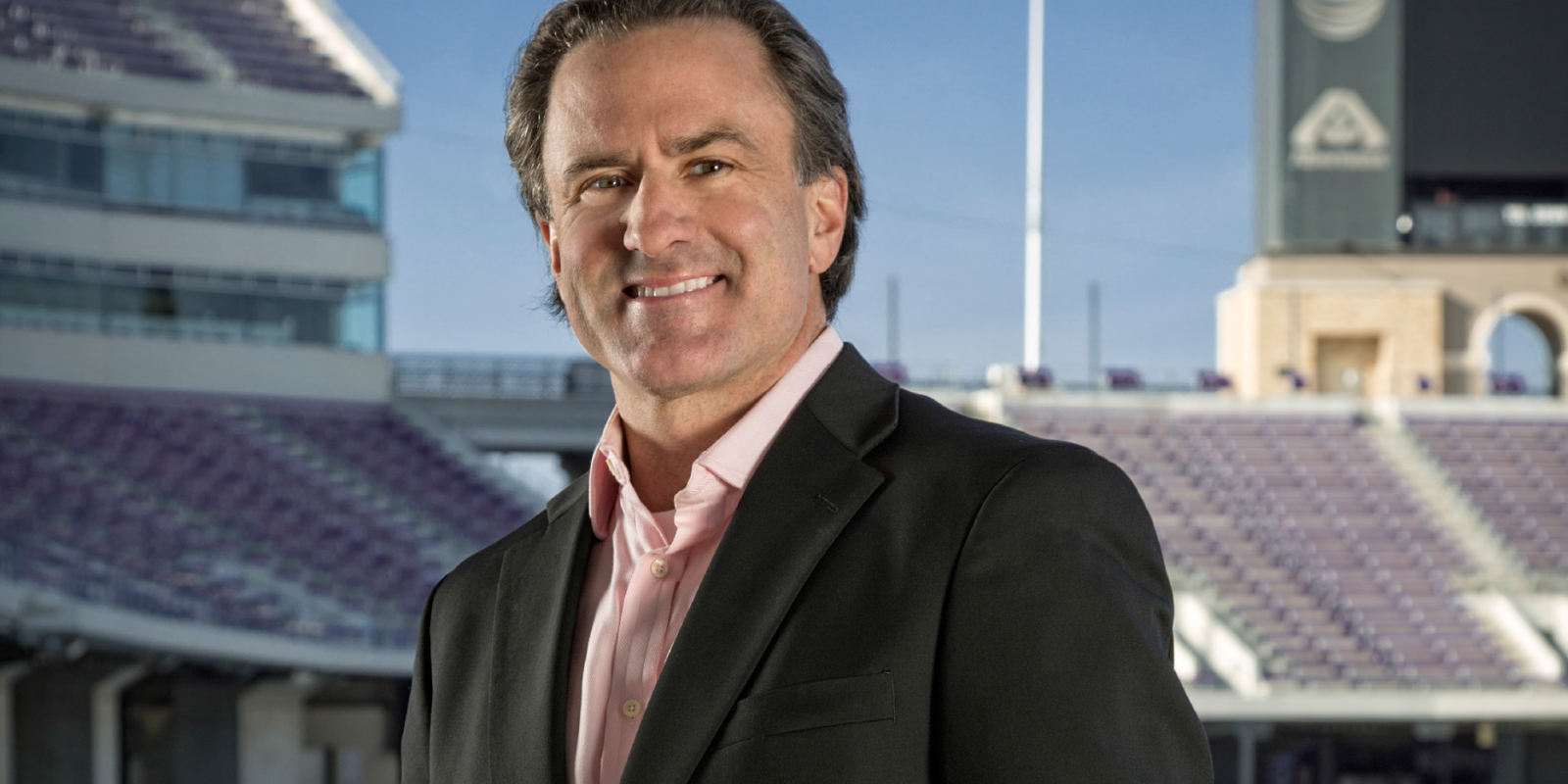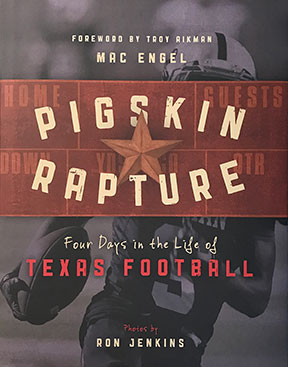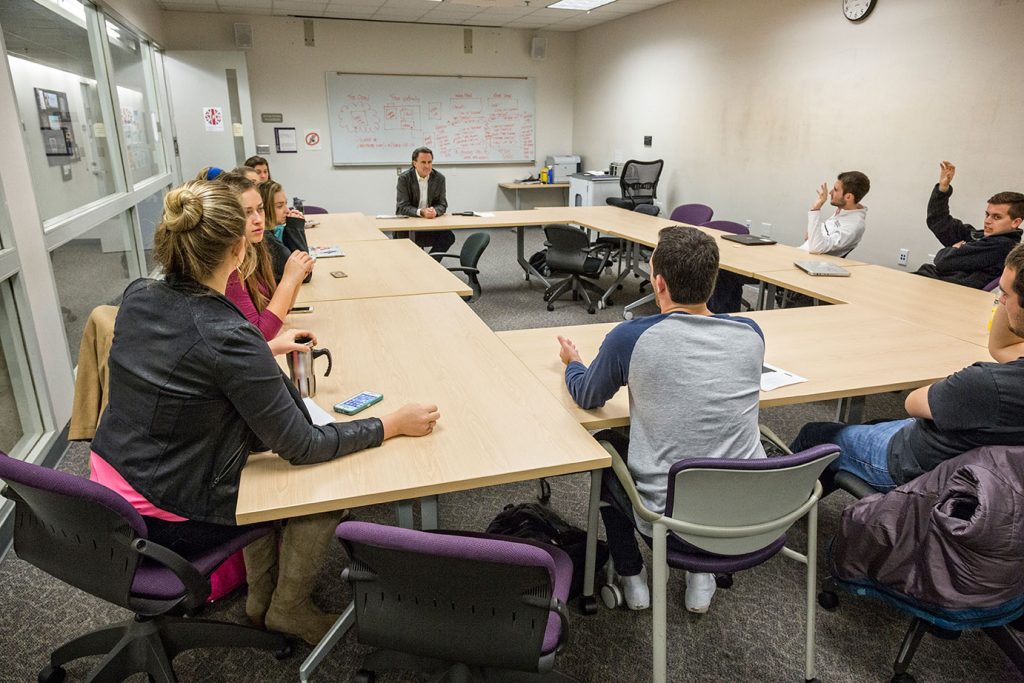
Mac Engel Knows Football is Bigger in Texas
The sports writer’s ultimate road trip records the sights, sounds and smells of the Lone Star State’s legendary football culture.
Four games in four days … in Texas.
That was the idea a Connecticut-based book publisher pitched to longtime sports journalist Theodore “Mac” Engel ’98 MLA. Engel took the ball and ran.
The result? An ultimate 96-hour road trip to record the sights, sounds and smells of the Lone Star State’s legendary football culture. Engel detailed the adventure in Pigskin Rapture: Four Days in the Life of Texas Football (Lone Star Books, 2016).
“I pitched him this idea that I actually had been thinking about for about 10 years,” said Rick Rinehart, executive editor at Globe Pequot in Guilford, Conn. “It was only in 2015 that the stars aligned and we had four consecutive days of football bracketed by two pro games.
“I didn’t know what to expect. I told him I wanted not to just cover the games but also the culture around the games — tailgate parties and anything having to do with Texas football,” said Rinehart. “What I got was really beyond my wildest dreams. It was just absolutely fabulous — from Mac’s reporting to Ron Jenkins’ pictures.”

The latest tome from Mac Engel ’98 MLA goes beyond the play-by-play of high school, college and professional matchups to explore the traditions and culture of Texas football.
Planning for game days
When football schedules were released in May 2015, finding four games that covered professional, college and high school football was easy. Deciding which games to skip was the hard part.
The October stretch included both of Texas’ pro teams playing at home, so the plan began with a Thursday night game between the Houston Texans and Indianapolis Colts at NRG Stadium in Houston. The marathon ended when the Dallas Cowboys took on the New England Patriots on a Sunday at AT&T Stadium in Arlington.
Rinehart wanted a game at legendary Odessa Permian High School, the team that became a household name when the best-selling Friday Night Lights was published some 25 years ago. It so happened the Panthers were hosting local rival Midland Lee for homecoming. Perfect.
For the college game, Texas A&M University and the University of Texas at Austin topped the wish list. Texas A&M was off that week, but Texas met the University of Oklahoma in the “Red River Showdown” at Cotton Bowl Stadium.
“We couldn’t get A&M or Baylor or TCU in it,” Engel said. “You want all these things, but you just can’t get to them all.”
While Rinehart picked the four games, Engel had free rein for the play-by-play in between. The whirlwind trip covered all things football: the good, the bad and the glittery.
Sneaking into Houston’s iconic Astrodome, walking around Rice Stadium, meeting high school football coaches, talking with the principal of Colts quarterback Andrew Luck’s high school. Talking with a homeless man who spends his days around a manicured football field, interviewing a University of Houston cheerleader while she fixed her hair, tailgating at NRG Stadium and chatting with Houston Texans cheerleaders before they hit the sidelines.
And that was all before Game One.
“I had a few rough ideas of where I wanted to go,” Engel said, “but most of it just fell into my lap. I just kept finding active football everywhere we went. I would find story after story, anecdote after anecdote everywhere I went.
“However big we think football is in Texas, it’s bigger. It’s everywhere.”
Play by play
Football is tough and involves a lot of resistance. Texans like that. “To do something in football, you have to push yourself through something or someone to achieve whatever it is, and I think that’s decidedly Texan and that’s why we relate to it so much. And we are such a huge, huge state, so there’s just more of it.”
Engel found a warm welcome from coaches, players and fans. “I would just walk in and they were like, ‘Yeah, sit down.’ It sort of restored your faith in people in sports.”
Day One ended about 1 a.m. Friday — enough time to catch four hours of sleep before a 7:30 a.m. flight to Midland-Odessa, where Day Two included stops at several high schools —one thanks to a wrong turn — and some KD’s Bar-B-Q before the showdown at Ratliff Stadium.
After all the pageantry surrounding a high school homecoming game ended, no late-night flights were available out of Odessa. A long, flat drive from West Texas put Engel and Jenkins back in Fort Worth about 3 a.m.
Day Three began early at Fair Park in Dallas, where the longtime Texas-Oklahoma rivalry is a college football and social tradition during the Texas State Fair.
The day ended closer to home at TCU hangout Buffalo Bros. on South University Drive in Fort Worth, where Engel joined the purple-clad crowd to watch the No. 2 Horned Frogs pull out a win on the road against Kansas State. (That experience is detailed on pages 158-163 of Pigskin Rapture.)
After a stop at New Mt. Carmel Missionary Baptist Church in Fort Worth (where Engel found an assistant pastor willing to talk football), Sunday was devoted to America’s team and its palatial home in AT&T Stadium.
In addition to the expected tailgating, the die-hard fans and the world-famous Dallas Cowboys cheerleaders, the book provides a peek into AT&T Stadium’s rich art collection, TV booth, Victoria’s Secret PINK store and the exclusive owner’s suite.
Going into the project, Engel had high expectations because he knew the book was a good idea. “But when I was driving back Sunday night, I knew I had something that was really, really good,” he said. “And I’m so proud of it.”
‘Some people are just cut out for this business’
Encouraged by his dad to go into sports media, Engel studied radio in high school, earned a bachelor’s degree in journalism at the University of Kansas and worked in sports media relations at Missouri State University.
While working on a master’s degree in liberal arts at TCU, Engel was a graduate assistant in the athletic media relations office. He was also a women’s basketball color analyst at TCU for on-the-road broadcasts, and his play-by-play man was the late Richard Durrett ’98.
After finishing graduate school, Engel wanted to write. Without any debt, he decided he could “live poor” for a while and freelance. “The [Fort Worth] Star-Telegram gave me the most work, and I just kept saying yes to any job, as anyone who does freelance knows,” he said.
In 1999, Engel joined the sports staff at the Star-Telegram, where he covered the Texas Rangers, Dallas Stars and Dallas Cowboys as a beat writer before becoming a sports columnist. “Some people are just cut out for this business, and I think Mac is one of those,” said Celeste Williams, managing editor/sports and features at the Star-Telegram.
“He has a beautiful mind. He sees things in a unique way,” said Williams, who has worked with Engel for 17 years. “He’ll tell me he’s going to write some column and I’ll go, ‘Yeah, I never even thought of that.’
“His columns are just so different from standard sports writers.”
Sports “can also cover really important things in our society — whether it’s race or gender or even political sometimes.”
Mac Engel
Engel also isn’t afraid to take a stand. “We believe that opinion pieces are kind of our bread and butter,” Williams said. “When you get a columnist to write about a topic, that’s what’s going to get attention. People are going to talk about it.
“He’s obviously doing his job because I bet it’s 50-50 love him or hate him.[Those who] can’t wait to read him or can’t stand to read him.”
Engel has created a voice that reaches past the printed sports page. “He’s very active on social media. He promotes his stuff. He’s on Facebook. He tweets. He’s one of our most savvy guys for stuff like that,” Williams said. “He knew from the beginning that was the way to go to get an audience. Because of that, people seek him out.”
In addition, twice a week Engel joins the Shan & RJ sports radio show on 105.3 The Fan.
The journalist’s other books include Tony Romo: America’s Next Quarterback (Triumph Books, 2007), Texas Stadium: America’s Home Field (Ascend Books, 2008) and Building the Perfect Star (Ascend Books, 2015). He is also an adjunct in the journalism department at the Bob Schieffer College of Communication. He taught “Special Topics: Issues in Sports Media” in the Fall 2016 semester.
“By no stretch of the imagination do I think I’m as accomplished as others,” Engel said. “But I’ve made a career in an industry that’s not easy to make a career in — especially these days.”
Engel appreciates all facets of life found at a ballgame. “Sports is one of the rare journalistic mediums where you can fuse together fun, entertainment and sometimes very serious, important life issues,” he said. “For all of the flaws that sports has, it can be a platform and conduit to really important life lessons about effort, persistence, failure and getting back up.
“With that, [sports] can also cover really important things in our society — whether it’s race or gender or even political sometimes.”
It’s not all fun and games
Sports journalism can also be a platform for asking the hard questions, as Engel has persisted in doing about accusations of sexual assault by Baylor football players. “What I try to do in my job is assess a situation and give my opinion about it, whether it’s TCU or Baylor or whomever. I got a lot of heat over what I wrote about Baylor,” Engel said, adding that he was accused of writing about the scandal because he is a TCU fan.
“That had nothing to do with it. It had everything to do with what I assessed was a college football program that had gone way too far in its control of the administration. That’s what I saw. I see it in a lot of other places but that to me was a negligent use of power.”
Engel accepts certain realities of college sports. “But for me and the Baylor story, some people were really hurt, and they were ignored. It was the way it was ignored that really bothered me. It had nothing to do with the fact that I live in [ZIP code] 76109 or have a box of T-shirts that say TCU.”
Not quite purple enough
Some Horned Frog fans think a box of T-shirts isn’t enough. As a sports journalist, Engel can’t openly bleed purple like other TCU alumni. Through the years, some Frogs have taken issue with that. “You know a lot of TCU fans think I’m the devil,” he said.
Devil or not, Engel wants to see the Horned Frogs win. “I’ve lived in Texas and Fort Worth longer than I’ve lived anywhere else. I’ve seen the impact of TCU being successful. I live right next to the school,” he said. “My home’s property value has gone up significantly and I know why. It’s because the football team is winning.”
As a sports columnist, Engel likes to see college teams each get a turn in the spotlight. “It was great for business when Baylor started winning. It was good for TCU when Baylor started winning. Everybody benefits from that rivalry. Everybody benefits when everyone has a run and everybody has a turn.”
Engel also hopes TCU’s men’s basketball does well under Coach Jamie Dixon, who became head coach in 2016. “I’ve seen how bad that team is,” he said, pointing back to 2013 when a 9-12 TCU upset the then-No. 5 Kansas Jayhawks.
“Remember when TCU beat Kansas in men’s basketball and all the students stormed the floor? I did undergrad at Kansas and I’m a Kansas basketball fan, but I couldn’t have been happier that Trent Johnson and all those kids got that moment, that shared common experience, which is really one of the neatest things about sports.”
Engel was on the field for TCU’s 2011 Rose Bowl victory against Wisconsin. “I saw that ball get tipped up because I was standing almost parallel to the play when it happened. And I looked around and saw these people I’ve known for years and I was so happy for them because they got that moment, and they never had that before,” he said. “There’s that part of you — no matter how neutral you are — that can’t help feel great for all of those people.”
At the end of Pigskin Rapture, Engel reflected on his football-paced four days, which he described as both routine and exceptional. He wrote: “The lure remains the chance of something memorable happening — like Texas upsetting Oklahoma, or TCU’s comeback at Kansas State — but the true hook of Texas football is not its size or the chance to watch a momentous game, but the people’s connection to the sport.”
“I think trying to be heard and read today is exponentially more difficult than ever before because of the volume — both in terms of the volume with which people speak and the number of outlets that exist that cover the exact same thing.”
Mac Engel
Sports Journalism: A Changing Industry
In almost 20 years in media, sports journalist Mac Engel has experienced a lot of changes in the industry.
“The business model that exists for journalists today is nothing like what it was for almost 100 years,” Engel said. “For more than 100 years, newspapers and then eventually TV in the ’60s had a monopoly on advertising, and the internet has destroyed that.
“I think trying to be heard and read today is exponentially more difficult than ever before because of the volume — both in terms of the volume with which people speak and the number of outlets that exist that cover the exact same thing.”
Another increasing challenge is the “homogenized voices” of teams and universities. “You can’t talk to anybody anymore. It’s becoming so difficult to interview people without 50 other people right there with you. Everybody is being coached by PR.”
Engel understands that owners and administrators have to be careful in a day when even the slightest misstep can be misconstrued. “Journalism can be a really unfair business,” he said. “As the interviewer, I’m waiting for that person to make a mistake. And it’s really unfair.
“You really see it in the political realm and you see it in sports and entertainment — when a person gives an opinion and then [that person gets] slaughtered for it,” Engel said. “You can’t win unless you have the thickest skin or simply do not care.”

An adjunct in the Bob Schieffer College of Communication, Mac Engel loves everything about teaching — except the grading. “Everybody should try it once just to see what it’s like to sit on the other side of the table,” said Engel, who taught “Special Topics: Issues in Sports Media” in Fall 2016.

Your comments are welcome
Comments
Related reading:
Features
Starpoint School’s Special Education
At age 50, the on-campus lab school is still giving students a chance to shine.
Features
Adam Fung’s Uncommon Arctic Adventure
The art professor is acting as an Arctic ambassador and filmmaker after his 19-day residency in the Far North.